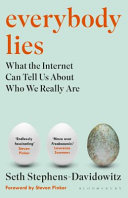

Big data has transformed how we understand human behavior. In 'Everybody Lies', Seth Stephens-Davidowitz argues that traditional surveys and questionnaires often misrepresent people's true thoughts and feelings. People tend to provide socially acceptable answers when asked directly about sensitive topics. However, analyzing online data—search queries, social media interactions, and other digital footprints—reveals a more honest and nuanced picture of human behavior. This shift from self-reported data to actual behavior data allows researchers and businesses to uncover hidden patterns and insights about society that were previously obscured. The implications of this are vast, impacting everything from marketing strategies to public policy.
Continue readingOne of the central themes of the book is the distinction between what people say and what they do. Stephens-Davidowitz illustrates this disconnect through various examples, showing that people often conform to societal norms when expressing their views publicly but behave differently in private. For instance, while many may publicly denounce certain prejudices, their online search behavior reveals a different story. This insight is crucial for businesses and policymakers who rely on public opinion surveys, as it highlights the potential for skewed data and the need for a deeper understanding of actual behaviors.
Continue readingAnonymity plays a significant role in how individuals express their thoughts and behaviors. In the digital age, people feel more liberated to explore taboo subjects when they believe their privacy is protected. Stephens-Davidowitz emphasizes that this anonymity can lead to more honest data collection, allowing researchers to access genuine insights into human behavior. This principle is particularly relevant in fields such as public health, marketing, and social research, where understanding the nuances of private behavior can lead to more effective strategies and interventions.
Continue readingUsing data analytics, 'Everybody Lies' uncovers some of the darker aspects of human nature, including racism, sexism, and other prejudices. By examining search data, Stephens-Davidowitz reveals that many people harbor biases that they would never openly admit to. This revelation is critical for understanding societal issues and addressing them effectively. By acknowledging these hidden truths, policymakers and social scientists can create more targeted and effective interventions to combat discrimination and promote equality.
Continue readingWhile big data provides valuable insights, it is essential to interpret this data within the appropriate context. Stephens-Davidowitz cautions against oversimplifying findings or drawing conclusions without considering the broader social and cultural factors at play. Data can be misleading if not analyzed carefully, and understanding the context behind the numbers is crucial for making informed decisions. This idea is particularly relevant for businesses and researchers who must navigate complex datasets and avoid misinterpretation.
Continue readingAs we move further into the digital age, the ability to harness big data will become increasingly important for decision-making across various fields. 'Everybody Lies' posits that organizations that leverage data analytics will have a competitive advantage in understanding customer behavior, predicting trends, and making more informed choices. This shift towards data-driven decision-making is not just a trend; it represents a fundamental change in how businesses and institutions operate, underscoring the need for professionals to develop skills in data analysis and interpretation.
Continue readingWith the rise of big data comes the responsibility to use this information ethically. Stephens-Davidowitz highlights the potential for misuse of data, such as invasion of privacy or manipulation of public opinion. As organizations collect and analyze more personal data, ethical considerations must guide their practices. This idea prompts readers to think critically about the implications of data collection and the importance of maintaining ethical standards in research and business practices.
Continue readingThe reading time for Everybody Lies depends on the reader's pace. However, this concise book summary covers the 7 key ideas from Everybody Lies, allowing you to quickly understand the main concepts, insights, and practical applications in around 20 min.
Everybody Lies is definitely worth reading. The book covers essential topics including The Power of Big Data, The Disconnect Between Public Sentiment and Private Behavior, The Role of Anonymity in Data Collection, providing practical insights and actionable advice. Whether you read the full book or our concise summary, Everybody Lies delivers valuable knowledge that can help you improve your understanding and apply these concepts in your personal or professional life.
Everybody Lies was written by Seth Stephens-Davidowitz.
If you enjoyed Everybody Lies by Seth Stephens-Davidowitz and want to explore similar topics or deepen your understanding, we highly recommend these related book summaries:
These books cover related themes, complementary concepts, and will help you build upon the knowledge gained from Everybody Lies. Each of these summaries provides concise insights that can further enhance your understanding and practical application of the ideas presented in Everybody Lies.